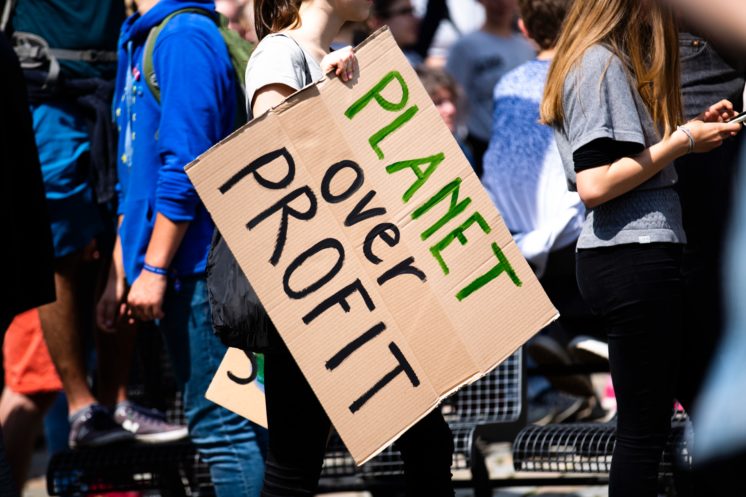America’s largest oil trade association, the American Petroleum Institute (API), and its members – most notably ExxonMobil – have embarked on a campaign over the last few decades promoting doubts regarding the causes of climate change.
 Photo: Markus Piske, Pexels, temporausch.com, CC0
Photo: Markus Piske, Pexels, temporausch.com, CC0This finding was revealed through the release of a collection of internal and external documents from ExxonMobil to Columbia University and The New York Times in 2017. These documents showed a large discrepancy in attitudes toward climate change between internal scientific reports released within ExxonMobil, and the public relations campaigns presented to the public. The report found that “accounting for expressions of reasonable doubt, 83% of peer-reviewed papers and 80% of internal documents acknowledge that climate change is real and human caused, yet only 12% of advertorials do so, with 81% instead expressing doubt”.[1]
Misleading advertisements
Between 1989 and 2004, Exxon Mobil regularly took out paid advertisements that were designed to look like editorials in the Op-Ed section of The New York Times. These public messages casted doubts on the credibility of climate science with statements such as, “We still don’t know what role man-made greenhouse cases might play in warming the planet”.[2] On a weekly basis, these so-called advertorials planted disinformation in the minds of readers.
A coordinated industry effort
Exxon Mobil was not alone in spreading misinformation about climate change. In 1998, the American Petroleum Institute released its “Roadmap” memo.[3] This internal strategy document outlined plans to use scientists as spokespeople to disseminate industry views with the goal of questioning the certainty of climate change.[4]
This plan included recruiting a group of five scientists who were new to the climate debate to participate in media outreach – but to keep their funding from oil companies a secret.[5] The memo stated, “victory will be achieved when average citizens ‘understand’ (recognize) uncertainties in climate science; recognition of uncertainties becomes part of the ‘conventional wisdom’.”[6]
In a prior internal memo from ExxonMobil, scientists highlighted that global warming was actively taking place.[7] This directly contradicts the public messages coming out from Exxon and the API. The Roadmap memo outlines that – in spite of evidence and internal acknowledgement of climate change – oil companies have embarked on a campaign over the last few decades to confuse and misinform the public.
Both the American Petroleum Institute[8] and ExxonMobil[9] have responded to an invitation to review an earlier version of this case study, and have indicated that they do not agree with the information as presented. ExxonMobil even accuses the parties behind some of the used sources from having designed a stigmatisation campaign themselves. For the purposes of completeness, a reference to the website that describes ExxonMobil’s perspective is included here.
[1] Geoffrey Supran and Naomi Oreskes, “Assessing ExxonMobil’s Climate Change Communications (1977–2014)”, Environmental Research Letters 12, no. 8 (August 2017): 1, https://doi.org/10.1088/1748-9326/aa815f (accessed October 22, 2019).
[2] Geoffrey Supran and Naomi Oreskes, “What Exxon Mobil Didn’t Say About Climate Change,” The New York Times, opinion section, 22 August 2017, https://www.nytimes.com/2017/08/22/opinion/exxon-climate-change-.html (accessed October 22, 2019).
[3] 1, “The Climate Deception Dossiers: Internal Fossil Fuel Industry Memos Reveal Decades of Corporate Disinformation”, (Cambridge, MA: Union of Concerned Scientists, 2015), 45., https://www.ucsusa.org/resources/climate-deception-dossiers (accessed October 22, 2019).
[4] Jeremy B. Merrill, “How Big Oil Dodges Facebook’s New Ad Transparency Rules,” ProPublica, 1 November 2018, https://www.propublica.org/article/how-big-oil-dodges-facebooks-new-ad-transparency-rules (accessed October 22, 2019).
[5] John H. Cushman Jr., “Industrial Group Plans to Battle Climate Treaty,” The New York Times, 26 April 1998, https://www.nytimes.com/1998/04/26/us/industrial-group-plans-to-battle-climate-treaty.html (accessed October 22, 2019).
[6] Mulvey and others, p. 9.
[7] Mulvey and others.
[8] American Petroleum Institute. “RE: Review announcement case description API”. October 10 2019
[9] ExxonMobil. “Feedback on SOMO draft language”. October 17 2019
